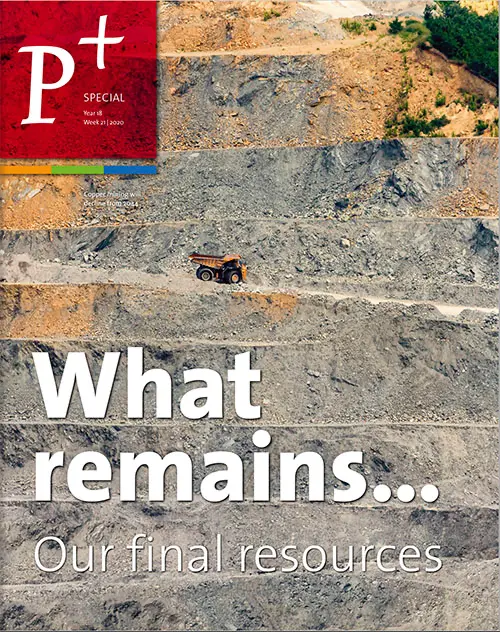World's Bookkeeper must distribute final resources
He is the World's Bookkeeper. Nobody knows better than the Norwegian professor Harald Sverdrup what remains of our raw materials. His computers calculate what is left in the earth, how much we can get out of it and even how much we will need in the coming years. All he cannot do is distribute these stocks fairly. The last metals and other materials should go to those companies that make it possible to reuse them completely. Otherwise the world will run out very quickly. Who will take on this task?
This week's P + Special is about the extraction of the last supplies of raw materials: "The World’s Bookkeeper". In the interview with Norwegian professor Harald Sverdrup, he discusses his complex computer calculations: “Between 2030 and 2070 we will peak in extraction of almost all raw materials. After that it gets less and less. "
The economic battle for the last raw materials has been going on for a long time. China, but also Saudi Arabia are buying up mines, where crucial metals are extracted. Without platinum or rare earth, the sustainable energy transition ends.
Therefore, according to Sverdrup, governments should come to an organization that distributes the remaining stocks to companies that process the materials in such a way that high percentages of recycling can be achieved. This is rarely the case now. Sverdrup states: "We will have to put some punishment on those companies that do not include reusability of raw materials in their design."
In this Special, P + offers an overview of the raw materials of which Sverdrup calculated when the peak moment falls. After that year, extraction will decline and the costs of mining will increase. For the important cobalt, for example, this can already be expected in six years, in 2026. The peak moment of oil extraction is already behind us.
His message echoes the old message from the Club of Rome, the company of critical thinkers who raised the alarm in the previous century to find that there were limits to our growth. This is no coincidence, because Sverdrup and his Icelandic colleague Anna Olafsdottir are working on a report for this this Club of Rome, in preparation of the upcoming vision WORLD7. The big difference is that today's computers can make much more complex and dynamic calculations than in 1972, the year the report "The Limits to Growth" shocked the world.
The business community still reacts with disbelief to this threatening message. Buyers of raw materials believe that there will still be sufficient residual stocks "in this big world". Moreover, they expect that there will be alternatives in due course. Sverdrup contradicts all this. “Geologists know how much is available in the geological formations on Earth and ask the question: how large is the stock that we can actually access? And: at what price? The latter is important. For some minerals, the stocks are very large, but economically impossible to use them. Sometimes they lie deep under the ocean floor, sometimes under large cities. If you found a large gold supply under the heart of New York City, you wouldn't be able to open a mine there. You don't even get a permit, let alone manage to tear down the Empire State Building. In other cases, the stocks are so deep that digging becomes far too expensive. Mining companies therefore write off all this. We just can't reach it.”
Sverdrup therefore states that we must be very careful with the raw materials that are now being extracted. “We have to reward companies that include the reusability of raw materials in their design. And we will have to put some punishment on those companies that don't do this.”
The key question is who will take on the division of what remains of us. None of the existing international institutions is suitable for this, according to Sverdrup: “Such an approach requires governance, so it has to come from governments. An EU or a national government, because there is no world government. The United Nations can only make recommendations. There is an International Resource Panel, but it is struggling with lack of funding and has been politicized. So not much happens there. We need efficient institutes.”
Sverdrup may come to the Netherlands in early September, to a meeting of the Club of Rome.
This autumn, AVANS University of Applied Sciences also offers students the opportunity to start research into the question of how companies can put natural capital on the balance sheet as assets. These are important figures because the depreciation due to destruction of raw materials is therefore visible in the profit and loss account. For example, shareholders and large investors such as pension funds can see how they get into their pockets when the circular economy is not realized. The research is based on the Finance and Accounting research group at AVANS Hogeschool and is headed by Marleen Janssen Groesbeek, co-author of this article.
Read the full interview with Harald Sverdrup (PDF) and his overview of the remaining world resources of raw materials.
Also available is the original PDF in Dutch of this P + Special "Wereldboekhouder". Download here.
Downloads
Meer info download je hier:
The Worlds Bookkeeper (1401 kb) Wereldboekhouder 'Wat ons nog rest...' (1423 kb)
